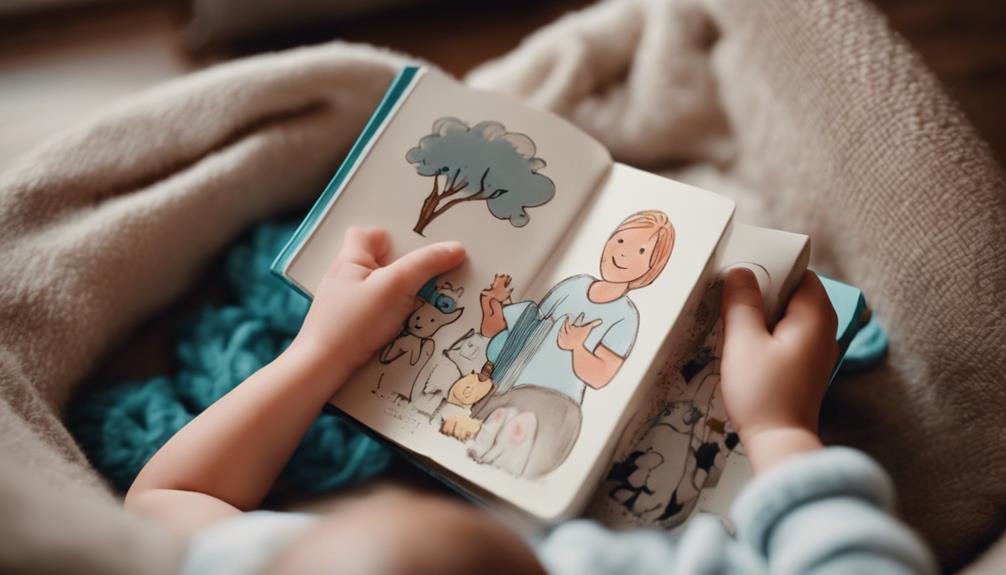You can start reading to your baby as soon as they are born. This early introduction helps enhance cognitive development, improve language skills, and strengthen the bond between you and your child. Reading to your baby exposes them to different sounds, language patterns, and the world around them, laying a solid groundwork for future learning. By selecting books that are suitable for their age, with bright colors and captivating stories, you can grab your baby’s attention and stimulate their developing senses. As your baby gets older, continuing to read together will further improve comprehension, memory skills, and critical thinking. By staying actively involved in this habit, you will learn more about how to support your baby’s growth and development.
Key Takeaways
- Start reading to your baby from birth to stimulate brain development.
- Introduce books with high-contrast visuals for newborns.
- Choose simple, colorful board books for infants aged 3-6 months.
- Reading enhances bonding, language skills, and cognitive growth.
- Reading habits established early benefit vocabulary and literacy skills.
Benefits of Reading to Newborns
Reading to newborns offers numerous benefits for their cognitive development and emotional well-being. Introducing books to your baby from an early age not only fosters a love for reading but also stimulates brain development and language skills. Research indicates that babies who are read to show faster language development and cognitive benefits compared to those who aren't exposed to reading at an early age. By engaging in shared reading sessions, infants begin to build a vocabulary and literacy skills advantage that can have lasting effects on their overall development.
Furthermore, reading to babies enhances fine motor skills, social development, and problem-solving abilities. It also positively impacts the parent-child relationship, leading to gentler parenting behavior.
The benefits of reading to newborns go beyond just storytelling; they lay the foundation for a strong bond between parent and child, setting the stage for a lifetime of learning and exploration.
Stimulating Brain Development Through Reading

Reading to your baby is a powerful way to stimulate brain development. It engages all senses, promotes communication skills, and lays the foundation for strong listening abilities.
Introducing concepts like colors and numbers early on can greatly impact your baby's cognitive growth.
Brain Growth Benefits
Engaging your baby in storytelling sessions can greatly enhance their brain growth and development. Reading to babies in their early years stimulates brain development by engaging all their senses.
Introducing concepts like numbers and colors through early reading lays a solid foundation for cognitive development. By kindergarten, a child's brain is already 90% of its adult size, underscoring the critical importance of early reading in maximizing brain growth and development.
The benefits extend beyond just knowledge acquisition; reading to babies aids in the development of memory skills, helping them retain information more effectively. Additionally, this practice plays an important role in building communication and listening skills from a young age, setting a strong basis for future language development.
Incorporating reading into your baby's routine not only fosters a love for books but also nurtures their cognitive abilities, contributing significantly to their overall growth and development.
Early Literacy Impact
Introducing your baby to books at an early age can have a significant impact on stimulating their brain development through reading. It's important to read to your baby from the very beginning to build their vocabulary and enhance their cognitive skills. Reading baby books not only engages their senses but also promotes communication and listening abilities.
By exposing your baby to concepts like numbers and colors through reading, you're aiding in their early cognitive development. Research shows that by kindergarten, a child's brain is 90% of its adult size, underscoring the significance of early literacy impact. Reading to babies from an early age not only maximizes brain development but also enhances memory skills.
Early exposure to reading lays a strong foundation for lifelong learning and cognitive development in children. Therefore, make it a habit to read to your baby regularly to make sure their brain growth benefits from the positive effects of early literacy impact.
Introducing Language to Your Baby

When introducing language to your baby, initiating early interaction is crucial to foster language development.
Engaging in reading routines with your infant not only enriches their vocabulary over time but also establishes a strong foundation for future literacy skills.
Early Language Exposure
How can you effectively introduce language to your baby in a way that fosters early development and communication skills?
Early language exposure plays an essential role in your baby's language development and pre-literacy skills. To begin introducing language to your baby, consider the following:
- Start Reading to Your Baby:
Begin to introduce a variety of books to your baby from a young age. Reading to your baby not only helps in language development but also instills a love of reading early on.
- Expose Your Baby to Diverse Vocabulary:
Infants as young as 2-3 months old can differentiate between languages and benefit from exposure to diverse vocabulary. Use a mix of words and sounds in your interactions with your baby to enhance their language skills.
- Foster a Strong Foundation for Literacy:
Early language exposure is vital for brain development, positively impacting cognitive abilities and language acquisition. Reading to your baby sets a strong foundation for future literacy skills and academic success.
Reading Routines for Infants
Start building a strong foundation for language development and communication skills by establishing consistent reading routines with your infant. Reading to babies, even in their first year, is a wonderful way to introduce language and foster a love for books.
Consider choosing books for babies that feature interactive features like textures, lift-the-flap elements, and engaging sounds. These interactive books can make reading routines for infants more enjoyable and engaging. Babies as young as 6-9 months can begin to appreciate short and simple stories with colorful illustrations during reading sessions.
Making it fun by using different voices or incorporating gentle movements can enhance their experience. Through reading routines, you not only introduce language to your baby but also strengthen the parent-child bond.
Choosing Age-Appropriate Books

To select age-appropriate books for your baby, consider their developmental stage and interests. When choosing books for your little one, keep in mind these tips:
- Opt for your baby's first board books, as they're sturdy and easy for tiny hands to grasp.
- Explore books with colorful illustrations and simple stories for infants aged 6-9 months to capture their attention.
- Introduce board books with repetitive phrases for toddlers aged 9-18 months, as they enjoy predictability in stories.
Captivating Interest With Colors and Patterns

Consider incorporating high-contrast black and white books to fascinate your newborn's visual senses and spark their interest in the world of colors and patterns. Newborns are naturally drawn to bold colors and simple patterns, making high-contrast visuals like black and white books ideal for engaging their developing visual abilities.
These books provide engaging visual stimuli that aid in stimulating a newborn's visual cortex and supporting brain connectivity. The stark contrast between black and white patterns captures infants' attention, enhancing their focus and fostering cognitive development during reading sessions.
By introducing babies to these fascinating visuals early on, you can set a strong foundation for their visual development and cognitive growth. Bold colors and simple patterns in baby books play a significant role in stimulating a newborn's visual senses and encouraging exploration of the world around them.
Embrace the power of high-contrast visuals to enrich your baby's early experiences with colors and patterns.
Setting a Strong Cognitive Foundation

Establishing a robust cognitive base for your baby begins with incorporating reading into your daily routine right from the start. Research shows that reading to your child from birth can greatly impact their language development and literacy skills. It's never too early to introduce books and read to children, even when they're infants.
Here are some key points to keep in mind:
- Read to your child: Make reading a regular part of your daily interactions with your baby.
- Introduce books with simple: Choose books with simple, colorful illustrations and engaging stories to capture your baby's attention.
- Research shows benefits: Studies suggest that reading to babies within their first year can enhance vocabulary and instill good reading habits early on.
Reading to Babies Aged 3-6 Months

Engage your 3-6 month old baby's developing senses and cognitive abilities by reading interactive board books with colorful illustrations and different textures. At this stage, reading to your baby not only provides a wonderful bonding opportunity but also sets the stage for language development and early literacy skills.
Babies aged 3-6 months are drawn to vibrant colors and simple stories that capture their attention. Opt for board books with interactive features such as flaps to lift, textures to feel, or peek-a-boo elements, as these can enhance your baby's listening skills and keep them engaged during reading sessions.
Interactive reading experiences with babies in this age group can help stimulate their cognitive abilities while fostering a love for books and storytelling. By incorporating colorful illustrations and engaging narratives, you're creating a multi-sensory experience that can support your baby's overall development.
Take this opportunity to introduce your little one to the joys of reading and lay a strong foundation for their language skills.
Reading to Toddlers and Beyond

Reading to toddlers and beyond enhances their language skills and nurtures a love for storytelling and books. It's essential to continue reading with your child as they grow to support their development.
Here are some tips to make reading time enjoyable and beneficial for both of you:
- Reread Favorite Books: Repeating familiar stories helps toddlers improve comprehension, memory skills, and fluency.
- Engage in Discussions: Encourage your toddler to ask questions, name objects in the book, and make connections to enhance critical thinking and language development.
- Use Interactive Elements: Incorporate funny voices, gestures, and interactive components to keep the reading session exciting and engaging.
When choosing books to read with toddlers, opt for sturdy options like fabric books that can withstand toddler handling, including the occasional chewing. Remember, your tone of voice and the way you engage your child during reading time play a significant role in making the experience enjoyable and educational.
Frequently Asked Questions
When Should You Start Reading to a Baby?
You should start reading to a baby as early as possible. Reading enhances vocabulary and literacy skills, fostering a positive relationship with books. Introduce reading into your daily routine to promote early language development and cognitive advantages for your little one.
Can I Read to My 3 Month Old?
Yes, you can read to your 3-month-old. Engage them with simple board books featuring high-contrast images. Reading aids in brain development, builds language skills, and fosters bonding. Your voice and the rhythm of reading provide comfort and security.
When Can I Start Reading to My Baby While Pregnant?
You can start reading to your baby while pregnant as early as 23 weeks gestation. Your voice and rhythms can soothe and connect with your baby, setting the stage for bonding and language development before they enter the world.
When Should You Read When You Have a Baby?
Start reading to your baby as early as possible to benefit their development. Regular reading sessions before their first birthday enhance vocabulary and literacy skills. Incorporate reading into daily routines for a positive impact.
Conclusion
To sum up, reading to your baby from a young age is a wonderful way to promote brain development, language skills, and a love for learning.
Remember, it's never too early to start sharing the joy of books with your little one.
As the saying goes, 'A book is a dream that you hold in your hands.'
So grab a cozy blanket, snuggle up with your baby, and let the adventures begin!










